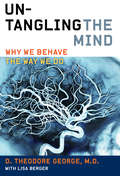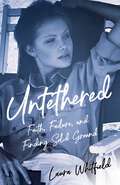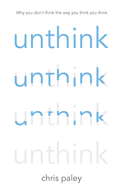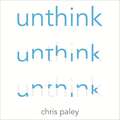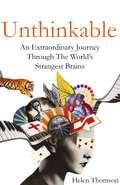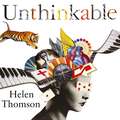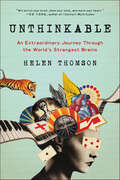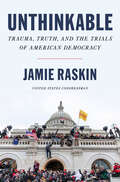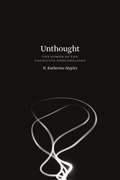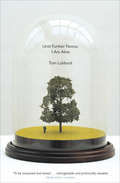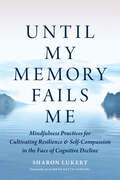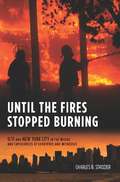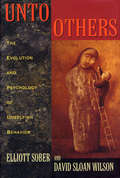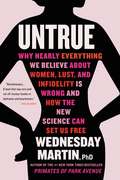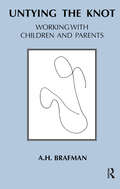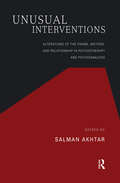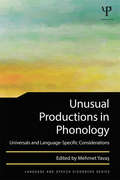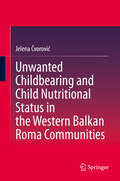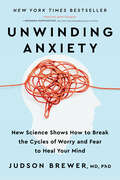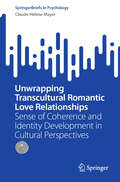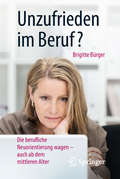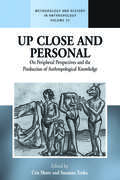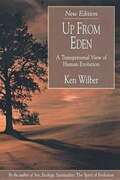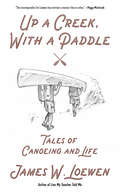- Table View
- List View
Untangling the Mind: Why We Behave the Way We Do
by David Theodore George Lisa BergerFree yourself from emotional turmoileven when that turmoil is caused by others!We have a much greater understanding of human behavior now than we did just a few decades ago. Yet even with this greater understanding of the human mind, why we do what we do can sometimes seem like a mystery. People are often left with unsettling questions about their own (or others') behavior.We ask ourselves, Why did I make a spectacle of myself? Why am I so stressed? Why am I constantly so negative?In his years as a clinician, Dr. Ted George has been struck by how much easier it is for people to say they have a physical illness than it is to admit they feel out of control with an emotion—be it anger, fear, or depression. With a physical issue, you have the source of the problem in concrete terms, such as in a lab report, but with an emotional issue, it can be much harder to define what's gone wrong. Untangling the Mind helps make sense of what's happening—and why. With knowledge of how the brain translates sensory signals into emotions, you will increase your understanding of your own—and others'—behaviors. As you learn about your psychological and neurological makeup, you will begin to see new possibilities for optimism, motivation, and well-being. We can control our behavior and our feelings, no matter how much they may have ruled us in the past, and Dr. George helps us know how. Once you understand the deeply rooted instincts that activate your emotions, you can live more peacefully, behave in ways that are more in keeping with the person you'd like to be, and enjoy your life more fully. And you'll be better able to remain unaffected by the drama of other people's emotional storms.
Untethered: Faith, Failure, and Finding Solid Ground
by Laura WhitfieldWhen Laura Whitfield was fourteen, her extraordinary brother, Lawrence, was killed in a mountain climbing accident. That night she had an epiphany: Life is short. Dream big, even if it means taking risks. So, after graduating from high school, she set out on her own, prepared to do just that.Laura spent her first summer after high school on North Carolina&’s Outer Banks, a magical few months filled with friendships, boys, and beer. There she met a handsome DJ who everyone called &“Steve the Dream,&” and risked her heart. When September came, Steve moved to New York City to become a model —prompting Laura to start thinking about modeling, too. After just one semester of college, still seeking to fill the void left by her brother&’s death, she dropped out and moved to New York to become a cover girl. But while juggling the demands of life in the big city—waiting tables, failed relationships, and the cutthroat world of modeling—she lost her way. A stirring memoir about a young woman&’s quest to find hope and stability after devastating loss, Untethered is Laura&’s story of overcoming shame, embracing faith, and learning that taking risks—and failing—can lead to a bigger life than you've ever dared to imagine.
Unthink: And how to harness the power of your unconscious
by Chris PaleyYour life is dominated by your unconscious mind: by thoughts you're unaware of and movements you don't realise you are making. Words, colours, mannerisms and other cues you don't realise are affecting you, change what you think. The confidence you have in your ability to reason and to consciously choose what to do is caused by a series of illusions that scientists are only just beginning to understand. The discovery of these illusions will change the way we see ourselves more than the discoveries of Darwin and Copernicus. Unthink explores the unconscious decisions we make, and covers a variety of topics, ranging from how we choose politicians and romantic partners to more abstract subjects such as whether we can consciously decide to move our fingers. The counter-intuitive observations that Chris makes in the book include: · If you want someone to fancy you, wear red and meet them somewhere frightening. · When waitresses repeat customers' orders back to them instead of just saying 'yes' they receive bigger tips. · To reduce your shopping bill, start at the beer and snacks end of the store and work backwards. · If you sit someone in an upright chair when you give them good news they will be prouder of their achievements. · Having a picture of your family on your desk might make you work harder, but you'll be rattier when you get home! Chris Paley shows us how we can understand ourselves and others better, by having a greater understanding of the way that the unconscious mind has an impact of the way we live our lives.
Unthink: And how to harness the power of your unconscious
by Chris PaleyYour life is dominated by your unconscious mind: by thoughts you're unaware of and movements you don't realise you are making. Words, colours, mannerisms and other cues you don't realise are affecting you, change what you think. The confidence you have in your ability to reason and to consciously choose what to do is caused by a series of illusions that scientists are only just beginning to understand. The discovery of these illusions will change the way we see ourselves more than the discoveries of Darwin and Copernicus. Unthink explores the unconscious decisions we make, and covers a variety of topics, ranging from how we choose politicians and romantic partners to more abstract subjects such as whether we can consciously decide to move our fingers. The counter-intuitive observations that Chris makes in the book include:· If you want someone to fancy you, wear red and meet them somewhere frightening.· When waitresses repeat customers' orders back to them instead of just saying 'yes' they receive bigger tips.· To reduce your shopping bill, start at the beer and snacks end of the store and work backwards.· If you sit someone in an upright chair when you give them good news they will be prouder of their achievements.· Having a picture of your family on your desk might make you work harder, but you'll be rattier when you get home!Chris Paley shows us how we can understand ourselves and others better, by having a greater understanding of the way that the unconscious mind has an impact of the way we live our lives.
Unthink: And how to harness the power of your unconscious
by Chris PaleyYour life is dominated by your unconscious mind: by thoughts you're unaware of and movements you don't realise you are making. Words, colours, mannerisms and other cues you don't realise are affecting you, change what you think. The confidence you have in your ability to reason and to consciously choose what to do is caused by a series of illusions that scientists are only just beginning to understand. The discovery of these illusions will change the way we see ourselves more than the discoveries of Darwin and Copernicus. Unthink explores the unconscious decisions we make, and covers a variety of topics, ranging from how we choose politicians and romantic partners to more abstract subjects such as whether we can consciously decide to move our fingers. The counter-intuitive observations that Chris makes in the book include:· If you want someone to fancy you, wear red and meet them somewhere frightening.· When waitresses repeat customers' orders back to them instead of just saying 'yes' they receive bigger tips.· To reduce your shopping bill, start at the beer and snacks end of the store and work backwards.· If you sit someone in an upright chair when you give them good news they will be prouder of their achievements.· Having a picture of your family on your desk might make you work harder, but you'll be rattier when you get home!Chris Paley shows us how we can understand ourselves and others better, by having a greater understanding of the way that the unconscious mind has an impact of the way we live our lives.(P)2014 Hodder & Stoughton
Unthinkable: An Extraordinary Journey Through the World's Strangest Brains
by Helen Thomson'Wonderfully clear, fluent and eye-opening' THE TIMES'A stirring scientific journey, a celebration of human diversity and a call to rethink the "unthinkable"' NATURE'An utterly fascinating romp around the nether regions of the human mind' BIG ISSUEIMAGINE . . . getting lost in a one-room flat; seeing auras; never forgetting a moment; a permanent orchestra in your head; turning into a tiger; life as an out-of-body experience; feeling other people's pain; being convinced you are dead; becoming a different person overnight.Our brains are far stranger than we think. We take it for granted that we can remember, feel emotion, navigate, empathise and understand the world around us, but how would our lives change if these abilities were dramatically enhanced - or disappeared overnight? Award-winning science writer Helen Thomson has spent years travelling the world tracking down incredibly rare brain disorders. In Unthinkable she tells the stories of nine extraordinary people. From the man who thinks he's a tiger to the doctor who feels the pain of others just by looking at them, their experiences illustrate how the brain can shape our lives in unexpected and, in some cases, brilliant and alarming ways. Delving into the rich histories of these conditions, exploring the very latest research and cutting-edge medical techniques, Thomson explains the workings of our consciousness, our emotions, our creativity and even the mechanisms that allow us to understand our own existence. Story by remarkable story, Unthinkable takes us on an unforgettable journey through the human brain. Discover how to forge memories that never disappear, how to grow an alien limb and how to make better decisions. Learn how to hallucinate and how to make yourself happier in a split second. Find out how to avoid getting lost, how to see more of your reality, even how exactly you can confirm you are alive. Think the unthinkable.
Unthinkable: An Extraordinary Journey Through the World's Strangest Brains
by Helen ThomsonHow the mind works -- everything from memory to emotion, navigation to creativity -- explained in nine extraordinary human stories.IMAGINE . . . getting lost in a one-room flat; seeing auras; never forgetting a moment; a permanent orchestra in your head; turning into a tiger; life as an out-of-body experience; feeling other people's pain; being convinced you are dead; becoming a different person overnight.Our brains are far stranger than we think. We take it for granted that we can remember, feel emotion, navigate, empathise and understand the world around us, but how would our lives change if these abilities were dramatically enhanced - or disappeared overnight? Award-winning science writer Helen Thomson has spent years travelling the world tracking down incredibly rare brain disorders. In Unthinkable she tells the stories of nine extraordinary people. From the man who thinks he's a tiger to the doctor who feels the pain of others just by looking at them, their experiences illustrate how the brain can shape our lives in unexpected and, in some cases, brilliant and alarming ways. Delving into the rich histories of these conditions, exploring the very latest research and cutting-edge medical techniques, Thomson explains the workings of our consciousness, our emotions, our creativity and even the mechanisms that allow us to understand our own existence. Story by remarkable story, Unthinkable takes us on an unforgettable journey through the human brain. Discover how to forge memories that never disappear, how to grow an alien limb and how to make better decisions. Learn how to hallucinate and how to make yourself happier in a split second. Find out how to avoid getting lost, how to see more of your reality, even how exactly you can confirm you are alive. Think the unthinkable.(P)2018 John Murray Press
Unthinkable: An Extraordinary Journey Through the World's Strangest Brains
by Helen ThomsonIn this Indiebound bestseller, the award-winning science writer unlocks the biggest mysteries of the human brain by examining nine extraordinary cases.Our brains are far stranger than we think. We take it for granted that we can remember, feel emotion, navigate, empathize and understand the world around us, but how would our lives change if these abilities were dramatically enhanced—or disappeared overnight?Helen Thomson has spent years travelling the world, tracking down incredibly rare brain disorders. In Unthinkable she tells the stories of nine extraordinary people she encountered along the way. From the man who thinks he’s a tiger to the doctor who feels the pain of others just by looking at them to a woman who hears music that’s not there, their experiences illustrate how the brain can shape our lives in unexpected and, in some cases, brilliant and alarming ways.Story by remarkable story, Unthinkable takes us on an unforgettable journey through the human brain. Discover how to forge memories that never disappear, how to grow an alien limb and how to make better decisions. Learn how to hallucinate and how to make yourself happier in a split second. Find out how to avoid getting lost, how to see more of your reality, even how exactly you can confirm you are alive. Think the unthinkable.“Helen Thomson’s remarkable book is an astonishing tour of the human brain in all its awesome power and bewildering variation . . . Unthinkable will enrich your brain, blow your mind, and warm your heart.” —Ed Yong, Pulitzer Prize-winning author
Unthinkable: Trauma, Truth, and the Trials of American Democracy
by Jamie RaskinIn this searing memoir, Congressman Jamie Raskin tells the story of the forty-five days at the start of 2021 that permanently changed his life—and his family’s—as he confronted the painful loss of his son to suicide, lived through the violent insurrection in our nation’s Capitol, and led the impeachment effort to hold President Trump accountable for inciting the political violence. <p><p> On December 31, 2020, Tommy Raskin, the only son of Maryland Congressman Jamie Raskin, tragically took his own life after a long struggle with depression. Seven days later on January 6, Congressman Raskin returned to Congress to help certify the 2020 Presidential election results, when violent insurrectionists led by right wing extremist groups stormed the U.S. Capitol hoping to hand four more years of power to President Donald Trump. <p><p> As our reeling nation mourned the deaths of numerous people and lamented the injuries of more than 140 police officers hurt in the attack, Congressman Raskin, a Constitutional law professor, was called upon to put aside his overwhelming grief—both personal and professional—and lead the impeachment effort against President Trump for inciting the violence. Together this nine-member team of House impeachment managers riveted a nation still in anguish, putting on an unprecedented Senate trial that produced the most bipartisan Presidential impeachment vote in American history. <p><p> Now for the first time, Congressman Raskin discusses this unimaginable convergence of personal and public trauma, detailing how the painful loss of his son and the power of Tommy’s convictions fueled the Congressman’s work in the aftermath of modern democracy’s darkest day. Going inside Congress on January 6, he recounts the horror of that day, a day that he and other Democrats had spent months preparing for under the correct assumption that they would encounter an attempted electoral coup—not against a President but for one. And yet, on January 6, he faced the one thing he had failed to anticipate: mass political violence designed to block Biden’s election. <p><p> With an inside account of leading the team prosecuting President Trump in the Senate, Congressman Raskin shares never before told stories of just how close we came to losing our democracy that fateful day and lays out the methodical prosecution that convinced Democrats and Republicans alike of Trump’s responsibility for inciting insurrectionary violence against our government. <p><p> Through it all, he reckons with the loss of his brilliant, remarkable son, a Harvard Law student whose values and memory continually inspired the Congressman to confront the dark impulses unleashed by Donald Trump. At turns, a moving story of a father coping with his pain and a revealing examination of holding President Trump accountable for the violence he fomented, this book is a vital reminder of the ongoing struggle for the soul of American democracy and the perseverance that our Constitution demands from us all.
Unthought: The Power of the Cognitive Nonconscious
by N. Katherine HaylesN. Katherine Hayles is known for breaking new ground at the intersection of the sciences and the humanities. In Unthought, she once again bridges disciplines by revealing how we think without thinking—how we use cognitive processes that are inaccessible to consciousness yet necessary for it to function. Marshalling fresh insights from neuroscience, cognitive science, cognitive biology, and literature, Hayles expands our understanding of cognition and demonstrates that it involves more than consciousness alone. Cognition, as Hayles defines it, is applicable not only to nonconscious processes in humans but to all forms of life, including unicellular organisms and plants. Startlingly, she also shows that cognition operates in the sophisticated information-processing abilities of technical systems: when humans and cognitive technical systems interact, they form “cognitive assemblages”—as found in urban traffic control, drones, and the trading algorithms of finance capital, for instance—and these assemblages are transforming life on earth. The result is what Hayles calls a “planetary cognitive ecology,” which includes both human and technical actors and which poses urgent questions to humanists and social scientists alike. At a time when scientific and technological advances are bringing far-reaching aspects of cognition into the public eye, Unthought reflects deeply on our contemporary situation and moves us toward a more sustainable and flourishing environment for all beings.
Until Further Notice, I Am Alive
by Tom Lubbock&“These are thoughts for us all, sooner or later—and this is a book I'll keep with me, as long as I live.&”—David Sexton, The Scotsman In 2008, art critic Tom Lubbock was diagnosed with a rare brain tumor and told he had only two years to live. Physically fit and healthy, and suffering from few symptoms, he faced his death with the same directness and courage that had marked the rest of his life. Lubbock was renowned for the clarity and unconventionality of his writing, and his characteristic fierce intelligence permeates this extraordinary chronicle. With unflinching honesty and curiosity, he repeatedly turns over the fact of his mortality, as he wrestles with the paradoxical question of how to live, knowing we&’re going to die. Defying the initial diagnosis, Tom survived for three years. He savored his remaining days; engaging with books, art, friends, his wife and their young son, while trying to stay focused on the fact of his impending death. There are medical details—he vividly describes the slow process of losing control over speech as the tumor gradually pressed down on the area of his brain responsible for language—but this is much more than a book about illness; rather, it's a book about a man who remains in thrall to life, as he inches closer to death. &“I hope that if I am ever diagnosed with a terminal illness I will remember to reread Until Further Notice, I Am Alive. It is, in its tough-minded way, truly joyous.&”—Lynn Barber, Sunday Times
Until My Memory Fails Me: Mindfulness Practices for Cultivating Resilience and Self-Compassion in the Face of Cognitive Decline
by Sharon LukertA definitive guide for navigating cognitive decline using mindfulness and meditation practices that includes practical advice and poignant stories from a Buddhist chaplain diagnosed with Mild Cognitive Impairment.When Buddhist chaplain Sharon Lukert was diagnosed with Mild Cognitive Impairment (MCI), she turned to spiritual practice and community to help her adjust to a new and ever-shifting reality. In Until My Memory Fails Me, she shares her hard-won wisdom as a guide for anyone standing at the gateway of cognitive decline.Through poignant storytelling and practical wisdom, Lukert offers specific ways to build resilience against the emotional swings and existential fear inherent in cognitive decline. The book includes:Instructions for more than a dozen mindfulness and meditation exercises, including The Handshake, Just Like Me, Open Awareness Meditation, and Tonglen (Lovingkindness) MeditationPractical advice on topics like understanding your diagnosis, how to talk to your medical providers, testing, dealing with bias, how to maintain communication, and managing new symptomsStories, advice, and encouragement from her peers in the MCI community and her &“dementia ancestors,&” those she worked with in her decades as a Buddhist chaplain in healthcare settingsWith raw vulnerability, Lukert demonstrates how to find courage, acceptance, and compassion even as your sense of self shifts underneath you.The first mindfulness book written specifically for people with MCI, the practices and lessons Lukert shares are also valuable for anyone experiencing cognitive decline caused by other disorders, as well as for loved ones and caregivers.
Until the Fires Stopped Burning: 9/11 and New York City in the Words and Experiences of Survivors and Witnesses
by Charles StrozierCharles B. Strozier's college lost sixty-eight alumni in the tragedy of 9/11, and the many courses he has taught on terrorism and related topics since have attracted dozens of survivors and family members. A practicing psychoanalyst in Manhattan, Strozier has also accepted many seared by the disaster into his care. In some ways, the grief he has encountered has felt familiar; in other ways, unprecedented. Compelled to investigate its unique character further, he launched a fascinating study into the conscious and unconscious meaning of the event, both for those who were physically close to the attack and for those who witnessed it beyond the immediate space of Ground Zero.Based on the testimony of survivors, bystanders, spectators, and victim's friends and families, Until the Fires Stopped Burning brings much-needed clarity to the conscious and unconscious meaning of 9/11 and its relationship to historical disaster, apocalyptic experience, unnatural death, and the psychological endurance of trauma. Strozier interprets and contextualizes the memories of witnesses and compares their encounter with 9/11 to the devastation of Hiroshima, Auschwitz, Katrina, and other events Kai Erikson has called a "new species of trouble" in the world. Organizing his study around "zones of sadness" in New York, Strozier powerfully evokes the multiple places in which his respondents confronted 9/11 while remaining sensitive to the personal, social, and cultural differences of these experiences. Most important, he distinguishes between 9/11 as an apocalyptic event (which he affirms it is not;rather, it is a monumental event), and 9/11 as an apocalyptic experience, which is crucial to understanding the act's affect on American life and a still-evolving culture of fear in the world.
Unto Others: The Evolution and Psychology of Unselfish Behavior
by David Sloan Wilson Elliot SoberNo matter what we do, however kind or generous our deeds may seem, a hidden motive of selfishness lurks—or so science has claimed for years. This book, whose publication promises to be a major scientific event, tells us differently. In Unto Others philosopher Elliott Sober and biologist David Sloan Wilson demonstrate once and for all that unselfish behavior is in fact an important feature of both biological and human nature. Their book provides a panoramic view of altruism throughout the animal kingdom—from self-sacrificing parasites to insects that subsume themselves in the superorganism of a colony to the human capacity for selflessness—even as it explains the evolutionary sense of such behavior. Explaining how altruistic behavior can evolve by natural selection, this book finally gives credence to the idea of group selection that was originally proposed by Darwin but denounced as heretical in the 1960s. With their account of this controversy, Sober and Wilson offer a detailed case study of scientific change as well as an indisputable argument for group selection as a legitimate theory in evolutionary biology. Unto Others also takes a novel evolutionary approach in explaining the ultimate psychological motives behind unselfish human behavior. Developing a theory of the proximate mechanisms that most likely evolved to motivate adaptive helping behavior, Sober and Wilson show how people and perhaps other species evolved the capacity to care for others as a goal in itself. A truly interdisciplinary work that blends biology, philosophy, psychology, and anthropology, this book will permanently change not just our view of selfless behavior but also our understanding of many issues in evolutionary biology and the social sciences.
Untrue: Why Nearly Everything We Believe About Women, Lust, and Infidelity Is Wrong and How the New Science Can Set Us Free
by Wednesday MartinFrom the #1 New York Times bestselling author of Primates of Park Avenue, a bold, timely reconsideration of female infidelity that will upend everything you thought you knew about women and sex.What do straight, married female revelers at an all-women's sex club in LA have in common with nomadic pastoralists in Namibia who bear children by men not their husbands? Like women worldwide, they crave sexual variety, novelty, and excitement. In ancient Greek tragedies, Netflix series, tabloids and pop songs, we've long portrayed such cheating women as dangerous and damaged. We love to hate women who are untrue. But who are they really? And why, in this age of female empowerment, do we continue to judge them so harshly? In Untrue, feminist author and cultural critic Wednesday Martin takes us on a bold, fascinating journey to reveal the unexpected evolutionary legacy and social realities that drive female faithlessness, while laying bare our motivations to contain women who step out. Blending accessible social science and interviews with sex researchers, anthropologists, and real women from all walks of life, Untrue challenges our deepest assumptions about ourselves, monogamy, and the women we think we know. From recent data suggesting women may struggle more than men with sexual exclusivity to the revolutionary idea that females of many species evolved to be "promiscuous" to Martin's trenchant assertion that female sexual autonomy is the ultimate metric of gender equality, Untrue will change the way you think about women and sex forever.
Untying the Knot: Working with Children and Parents
by A.H. BrafmanUntying The Knot sets out to present a clinical approach to cases where the referred patient is a child or adolescent, but in which the parents are intimately involved in the therapeutic situation.Three fundamental principles inform the work: firstly, that early experience influences present lives; secondly, that unconscious feelings and fantasies are elements which shape everyday conscious experience; and thirdly, that the interaction of children and parents leads to patterns which become self-perpetuating and make it virtually impossible to define what is cause and what is effect in their relationship.Dr Brafman acknowledges the pioneering work of Donald Winnicott in the treatment of children, emphasizing particularly his refusal to be bound by rigid notions of treatment modalities, but instead to go to the heart of the matter - an understanding of the child's own confusion and pain, and then, through its elucidation and expression, to bring relief.
Unusual Interventions: Alterations of the Frame, Method, and Relationship in Psychotherapy and Psychoanalysis
by Salman AkhtarRadical departures from the set and familiar rules of technique often become necessary in the course of psychotherapy and psychoanalysis. These can include conducting a session outside the office, giving advice, not charging fees, talking about oneself, giving a gift to the patient, and so on. Such interventions have so far remained imbued with mystery or, worse, have been the staple of cocktail party conversations. Unusual Interventions brings a variety of exceptional measures together to highlight their indications, risks, and their potential anchors in psychoanalytic theory of human relatedness. In accomplishing this, the book itself becomes an unusual addition to the literature on the technique of psychotherapy and psychoanalysis.
Unusual Productions in Phonology: Universals and Language-Specific Considerations
by Mehmet YavasThe universalist view that acquisition of phonology is guided by universal principles has been the dominant position for decades. More recently, an alternative view has brought into focus the relationship between developmental markedness and language-specific input frequencies. With entirely original chapters on non-ambient-like productions by typically and atypically developing children, and second language learners, Unusual Productions in Phonology delves deeply into these competing explanations to show that patterns observed do not uniquely lend themselves to one or the other explanations. Rather, they point towards the need for both universal markedness and statistical input considerations in any attempted explanation. Containing contributions from leading researchers from around the world, this impressive collection is a must-have resource for any researcher, practitioner, or advanced student specializing in phonology, cognitive psychology, applied linguistics, and communication disorders.
Unwanted Childbearing and Child Nutritional Status in the Western Balkan Roma Communities
by Jelena ČvorovićThis book investigates the relationship between maternal investment, unwanted births, and child nutritional outcomes in five poor communities of the Western Balkan Roma. Based on an evolutionary approach, the book directly assesses variability in Roma mothers’ parental care using data from UNICEF Multiple Indicator Cluster Surveys 5 and 6 for the Roma settlements in Serbia, Montenegro, Kosovo, Macedonia, and Bosnia and Herzegovina. The book includes useful information about Roma communities in the Western Balkans and their history and sufferings in the region. It reviews this history against the data on unwanted childbearing globally and in low- and middle-income countries. It addresses concerns related to Roma people's integration into European society, despite their longstanding presence in Europe. The book analyses the existence of health differentials among Roma children themselves, suggesting that some children are especially vulnerable. Therefore, it critically assesses how multiple (levels of) vulnerabilities affect differential Roma parental investment in children. This book is a useful resource for researchers interested in Roma studies, children's well-being, wellbeing of marginal groups, social work and social justice.
Unwinding Anxiety: New Science Shows How to Break the Cycles of Worry and Fear to Heal Your Mind
by Judson BrewerA step-by-step plan clinically proven to break the cycle of worry and fear that drives anxiety and addictive habitsWe are living through one of the most anxious periods any of us can remember. Whether facing issues as public as a pandemic or as personal as having kids at home and fighting the urge to reach for the wine bottle every night, we are feeling overwhelmed and out of control. But in this timely book, Judson Brewer explains how to uproot anxiety at its source using brain-based techniques and small hacks accessible to anyone. We think of anxiety as everything from mild unease to full-blown panic. But it's also what drives the addictive behaviors and bad habits we use to cope (e.g. stress eating, procrastination, doom scrolling and social media). Plus, anxiety lives in a part of the brain that resists rational thought. So we get stuck in anxiety habit loops that we can't think our way out of or use willpower to overcome. Dr. Brewer teaches us map our brains to discover our triggers, defuse them with the simple but powerful practice of curiosity, and to train our brains using mindfulness and other practices that his lab has proven can work.Distilling more than 20 years of research and hands-on work with thousands of patients, including Olympic athletes and coaches, and leaders in government and business, Dr. Brewer has created a clear, solution-oriented program that anyone can use to feel better - no matter how anxious they feel.
Unwrapping Transcultural Romantic Love Relationships: Sense of Coherence and Identity Development in Cultural Perspectives (SpringerBriefs in Psychology)
by Claude-Hélène MayerThis research study explores the interlinkages of three major themes, namely transcultural romantic love relationships (TRLRs), sense of coherence (SOC), and identity development (ID) in individuals who are presently involved in romantic love relationships (RLR) with partners from different cultural or ethnic backgrounds. The study uses a qualitative research design within the hermeneutical interpretative research paradigm, aiming to understand the interlinkages of TRLR, SOC, and ID. Based on purposive and snowball sampling techniques, the study includes 22 participants (12 female and 10 male) between 23 and 68 years of age, from 14 different (self-defined) cultural backgrounds. At the time of the interview, participants had been in TRLRs for at least 6 months to a maximum of 26 years. Data were collected through semi-structured interviews and analysed through content analysis. Qualitative quality criteria and ethical considerations were applied. The findings show that TRLRs are firmly based on relationship qualities, strong feelings, common actions, spirituality, and future orientation. Further, the findings present clear interlinkages between TRLR and SOC, contributing positively to meaningfulness, manageability, and comprehensibility. Finally, TRLRs support SOC on intrapersonal, cultural, and interpersonal levels. In addition, they influence the development of identity awareness, actions, feelings, and sexual SOC. Conclusions, limitations, and recommendations for theory and practice are provided.
Unzufrieden im Beruf?: Die berufliche Neuorientierung wagen – auch ab dem mittleren Alter
by Brigitte Bürger Harald SchröderDieser Ratgeber zeigt allen, die ab dem mittleren Alter nach mehr Zufriedenheit im Beruf suchen oder sich beruflich neu orientieren wollen, wie sie dies erreichen, die dafür nötige motivierende Kraft entfalten und auftauchende Hindernisse überwinden können. Brigitte Bürger, erfahrene Beraterin auf diesem Gebiet, bietet dafür hilfreiche "Leitplanken" zur Orientierung und begleitet Menschen mit beruflichem Änderungswunsch Schritt für Schritt durch den oft unübersichtlichen Prozess des Wandels – angereichert mit vielen pointierten Tipps und praktischen Übungen zum Ausprobieren: So gewinnen Sie Klarheit über Ihre nächsten Ziele. So treffen Sie stimmige Entscheidungen. So sammeln Sie Kraft für den vor Ihnen liegenden Weg. So gehen Sie mit Ambivalenz, Antreibern und Rückschlägen um.
Up Close and Personal
by Cris Shore Susanna TrnkaCombining rich personal accounts from twelve veteran anthropologists with reflexive analyses of the state of anthropology today, this book is a treatise on theory and method offering fresh insights into the production of anthropological knowledge, from the creation of key concepts to major paradigm shifts. Particular focus is given to how 'peripheral perspectives' can help re-shape the discipline and the ways that anthropologists think about contemporary culture and society. From urban Maori communities in Aotearoa/New Zealand to the Highlands of Papua New Guinea, from Arnhem Land in Australia to the villages of Yorkshire, these accounts take us to the heart of the anthropological endeavour, decentring mainstream perspectives, and revealing the intimate relationships and processes that create anthropological knowledge.
Up From Eden: A Transpersonal View of Human Evolution
by Ken WilberThis book chronicles humanity's cultural and psychospiritual evolutionary journey over some six million years from its primal past into its dazzling cosmic future.
Up a Creek, with a Paddle: Tales of Canoeing and Life
by James W. LoewenUp a Creek, With a Paddle is an intimate and often humorous memoir by the author of Lies My Teacher Told Me, James W. Loewen, who holds the distinction of being the best-selling living sociologist today. Rivers are good metaphors for life, and paddling for living. In this little book, Loewen skillfully makes these connections without sermonizing, resulting in nuggets of wisdom about how to live, how to act meaningfully, and perhaps how to die. Loewen also returns to his life's work and gently addresses the origins of racism and inequality, the theory of history, and the ties between the two. But mostly, as in his life, he finds rueful humor in every canoeing debacle—and he has had many! "A memoir like no other. I laughed at his delightful stories of canoeing fiascos that repeatedly answered his question, "What could possibly go wrong?" In quieter intervals, I learned from his reflections on history, ethics, and race relations. About death he is funny but unflinching. His spirit will live on, though, in the ways that history is told. This book's energy can sustain and inspire those who follow." —Peggy McIntosh, author of White Privilege
